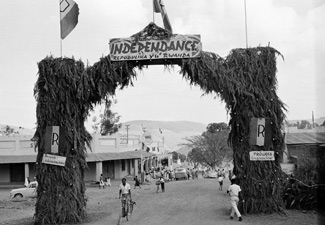History
When the United Nations was established in 1945, 750 million people - almost a third of the world's population - lived in Territories that were non-self-governing, dependent on colonial Powers. Today, fewer than 2 million people live in such Territories.

One of the specially decorated arches set up in Kigali, Rwanda to
mark that nation's independence on 1 July 1962. (UN Photo)
The Charter of the United Nations established, in Chapter XI (Articles 73 and 74), the principles that continue to guide United Nations decolonization efforts, including respect for self-determination of all peoples.
The United Nations Charter also established the International Trusteeship System in Chapter XII (articles 75-85) and the Trusteeship Council in Chapter XIII (articles 86-91) to monitor certain Territories, known as "Trust" Territories. Those Territories, each subject to separate agreements with administering States, were formally administered under Mandates from the League of Nations, or were separated from countries defeated in the Second World War, or were voluntarily placed under the system by States responsible for their administration. Eleven Territories were placed under this system.
Since the creation of the United Nations more than 80 former colonies have gained their independence. Among them, all eleven Trust Territories have achieved self-determination through independence or free association with an independent State. There are 17 Non-Self-Governing Territories remaining today.
The Charter binds administering Powers to recognize that the interests of dependent Territories are paramount, to agree to promote social, economic, political and educational progress in the Territories, to assist in developing appropriate forms of self-government and to take into account the political aspirations and stages of development and advancement of each Territory. Administering Powers are also obliged under the Charter to convey to the United Nations information on conditions in the Territories. The United Nations monitors progress towards self-determination in the Territories.
Hoping to speed the progress of decolonization, the General Assembly adopted, in 1960, the Declaration on the Granting of Independence to Colonial Countries and Peoples. Known as the Declaration on decolonization, it stated that all people have a right to self-determination and proclaimed that colonialism should be brought to a speedy and unconditional end.
In 1962 the General Assembly established the Special Committee on Decolonization to monitor implementation of the Declaration and to make recommendations on its application.
In 1990, the General Assembly proclaimed 1990-2000 as the International Decade for the Eradication of Colonialism and adopted a Plan of Action. In 2001, the Second International Decade for the Eradication of Colonialism was proclaimed. In 2011, the General Assembly proclaimed 2011-2020 as the Third International Decade for the Eradication of Colonialism.
